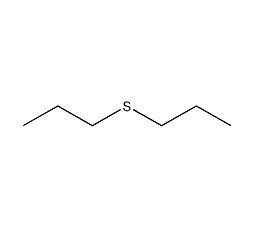
Structural formula
| Business number | 033M |
|---|---|
| Molecular formula | C6H14S |
| Molecular weight | 118.24 |
| label |
dipropyl sulfide, propyl sulfide, Di-n-propyl sulfide, di-n-propyl sulfide, Di-n-propyl monosulfide, propyl sulfide, 1-(Propylsulfanyl)propane, Propyl monosulfide, 1,1′-Thiobispropane, linear compound |
Numbering system
CAS number:111-47-7
MDL number:MFCD00009379
EINECS number:203-873-8
RTECS number:None
BRN number:1719002
PubChem number:24898640
Physical property data
1. Properties: colorless or light yellow liquid with special smell. [1]
2. Melting point (℃): -102.5[2]
3. Boiling point (℃): 142.4[3]
4. Relative density (water = 1): 0.84[4]
5. Saturated steam Pressure (kPa): 1.33 (32.3℃) [5]
6. Critical pressure (MPa): 3.08~3.47[6]
7. Octanol/water partition coefficient: 2.61~2.88[7]
8. Flash point (℃): 28[8]
9. Explosion upper limit (%): 8.6[9]
10. Explosion lower limit (%): 1[10 ]
11. Solubility: Insoluble in water, miscible in ethanol, ether, chloroform, and carbon tetrachloride. [11]
Toxicological data
1. Acute toxicity No data available
2. Irritation No data available
Ecological data
1. Ecotoxicity No data available
2. Biodegradability No data available
3. Non-biodegradability No information yet
Molecular structure data
1. Molar refractive index: 37.84
2. Molar volume (cm3/mol): 141.5
3. Isotonic specific volume (90.2K ): 321.5
4. Surface tension (dyne/cm): 26.6
5. Polarizability (10-24cm3): 15.00
Compute chemical data
1. Reference value for hydrophobic parameter calculation (XlogP): 2.7
2. Number of hydrogen bond donors: 0
3. Number of hydrogen bond acceptors: 1
4. Number of rotatable chemical bonds: 4
5. Number of tautomers: none
6. Topological molecule polar surface area 25.3
7. Number of heavy atoms: 7
8. Surface charge: 0
9. Complexity: 23.4
10. Number of isotope atoms: 0
11. Determined number of atomic stereocenters: 0
12. Uncertain number of atomic stereocenters: 0
13. Determine the number of stereocenters of chemical bonds: 0
14. Uncertain number of stereocenters of chemical bonds: 0
15. Number of covalent bond units: 1
Properties and stability
1. Stability[12] Stable
2. Incompatible substances[13] Strong oxidizing agent
3. Conditions to avoid contact[14] Heating
4. Polymerization Hazards[15] No polymerization
5. Decomposition products[16] Hydrogen sulfide
Storage method
Storage Precautions[17] Stored in a cool, ventilated warehouse. Keep away from fire and heat sources. The storage temperature should not exceed 37℃. Keep container tightly sealed. should be kept away from oxidizer, do not store together. Use explosion-proof lighting and ventilation facilities. It is prohibited to use mechanical equipment and tools that are prone to sparks. The storage area should be equipped with emergency release equipment and suitable containment materials.
Synthesis method
None
Purpose
1. Used as an intermediate in organic synthesis. [18]

 微信扫一扫打赏
微信扫一扫打赏

